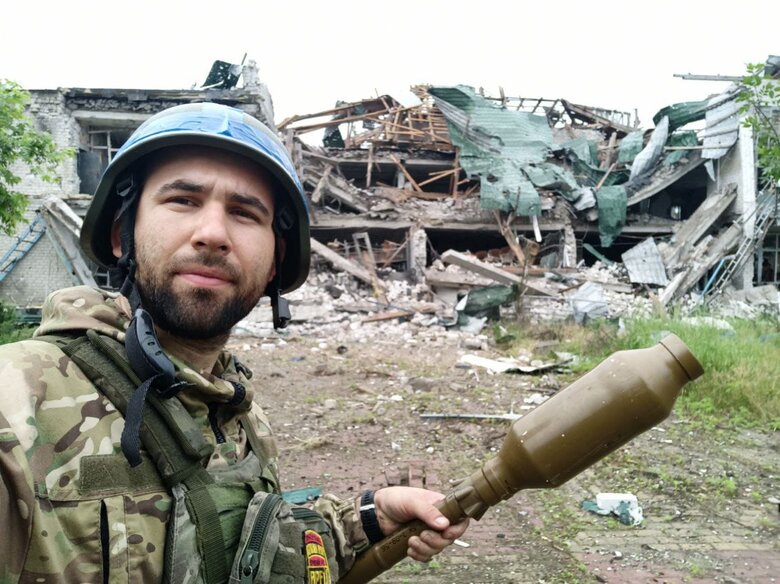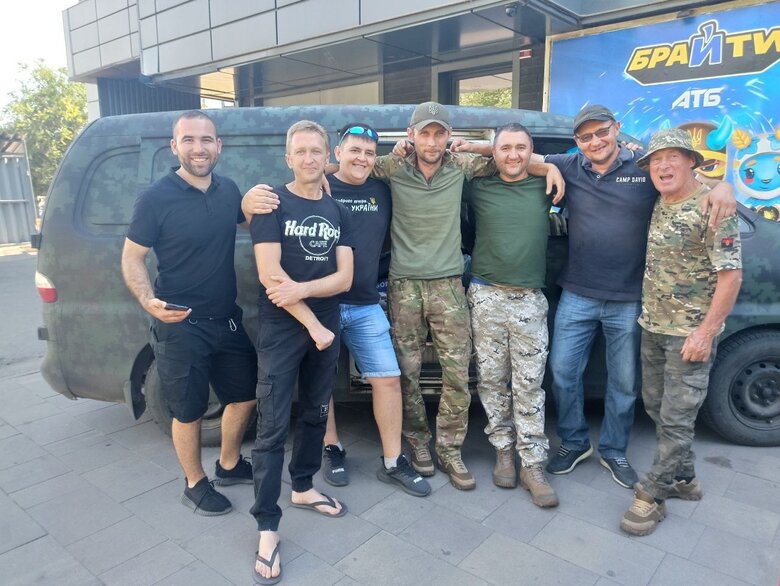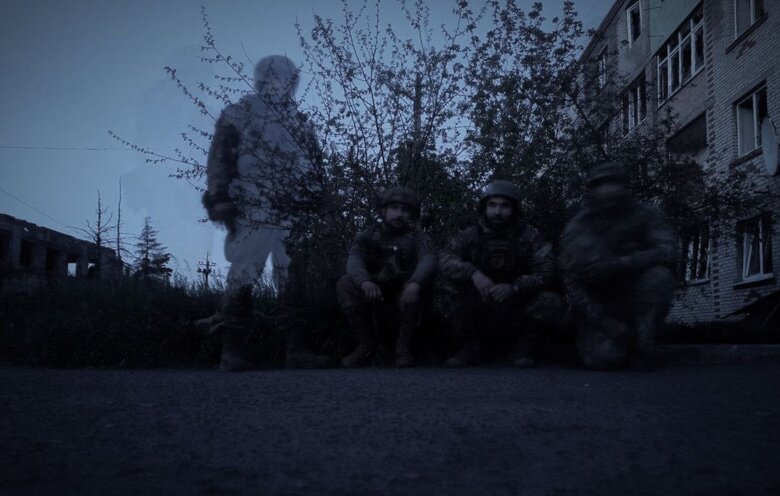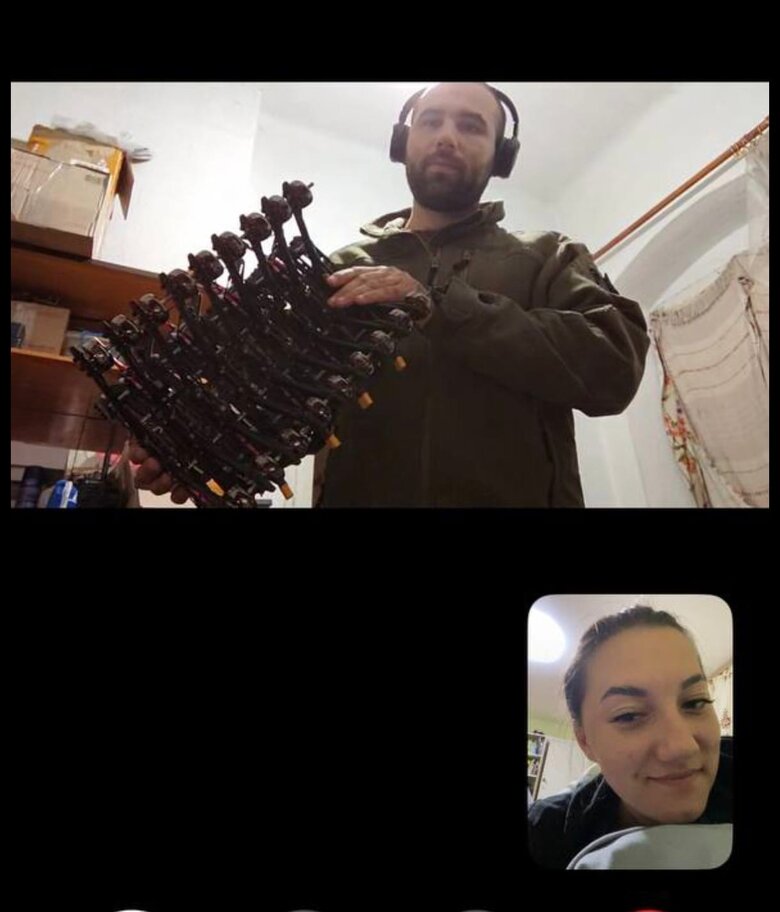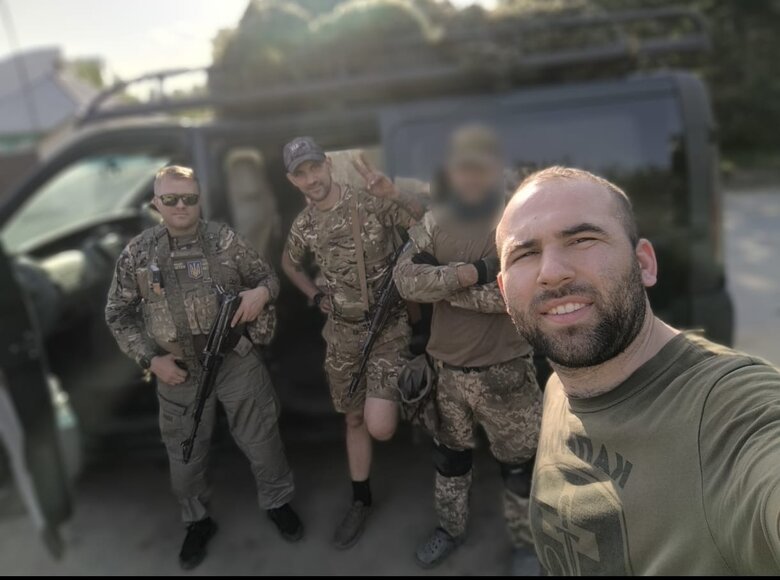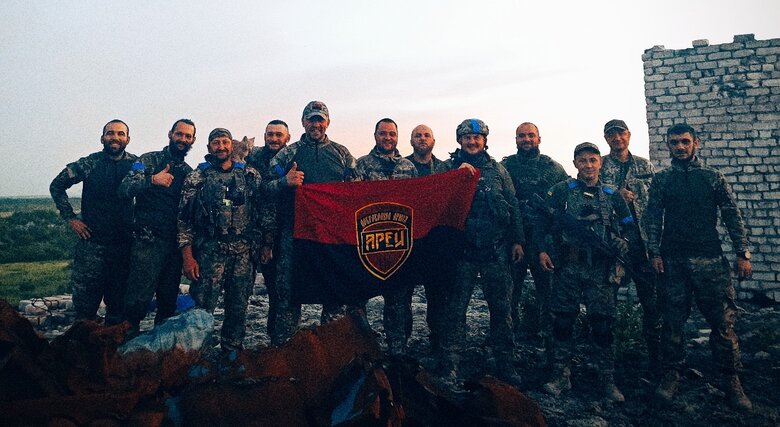Pilot with call sign Chaplain: "State has given Russian hundred drones, and he throws them around like stones. We have different story"
The commander of the Drongo UAV Strike Group of the "Arei" Battalion of the Ukrainian Volunteer Army, Serhii, call sign Chaplain, was a journalist in civilian life and served in a Protestant church. He was actively involved in social activities. He started his career in the Russian-Ukrainian war in 2022.
- "In December 2021, I talked to my pastor about it: if great war starts, I will take part in it," he explains his position, "I said this because I had to hand over my responsibilities in the church. As a team, we had to understand who would act how. So, the internal decision to go to the front appeared even then.
- How did it start for you?
- I met the Great War at home in Voznesensk. I went to the military commissariat. The first time I was told that there were no weapons. The second time they also gave me excuses. It didn't work out for me here. Then I joined our local headquarters. Our publication is the largest in the area, so it became a bridge for communication between the authorities, the military administration, and people. After all, nothing was clear. There was a complete lack of coordination. So I was responsible for this communication. That was before the hostilities in our city, which began on 2 March.
When the enemy retreated and everything was more or less quiet, we switched to helping people and volunteering.
Then, in the summer of 2022, I met with my friend, the head of the Voznesensk District Council, Spartak Gukasyan. He asked me, "Why don't you write anything? There are no reports." I answered: "I don't see any need for that. I would rather go and film the military. I want to show their lives and also leave a memory, because some of them may not be around tomorrow or the day after tomorrow..." He agreed with the military. They turned out to be volunteers from the Ukrainian Volunteer Army who had defended Voznesensk at the beginning of the full-scale war and had combat experience. I organised the trip. They held positions opposite Velyka Oleksandrivka in the Kherson region. I met with the commander, Oleksandr Hryshchuk, call sign Macedonian. I told him: "I want to film your feat, your everyday life. I also want to find out what your needs are, because our church wants to help you." He agreed, and I went with their group to the front line. I spent almost a day there with the guys. I made a documentary about them. I really admired them. I was very impressed. I learnt that they fight voluntarily, without salaries, with mutual respect, not the attitude: I am the boss and you are a fool. I was bribed by their internal atmosphere. For me, it resonated with the Cossacks - that spirit. Back then, I noticed for myself: if I were to go to the front, it would be with these people, because I share their views and values.
So I came back home. We started helping them. And inside me, this desire to fight was rising more and more. I started praying and asking God what I should do. I got the answer that I had to go. I told Macedonian that I wanted to join them. He asked me again: "Are you sure you want to do this? The trenches, the mud, the danger...". I answered in the affirmative.
- Who were you supposed to be? An infantryman?
- Yes, I originally planned to be a fighter. But before I left, I consulted my pastor. He said: "Almost everyone can hold a weapon. Not many can carry the word of God and save souls. If the latter is more important to you, then go as a chaplain." I prayed some more, took up my post and decided to listen. I came to the guys and told the commander about my decision. He is a really cool guy. He said: "We will accept you in any status. Here are the people for you. You have the green light". Just after the liberation of Nova Oleksandrivka, I joined the battalion as a chaplain. I conducted services, communicated with the soldiers, and at the same time, knowing the needs of the unit, continued to volunteer. On New Year's Eve (2022-2023), the battalion was recovering from active combat operations. I went home. Being a creative person, I started thinking about how to improve the situation. At that time, I was already familiar with drones, because before the great war I was engaged in video filming. Since 2018, I have had my own drone, which I lost during aerial reconnaissance with the 80th Brigade in Voznesensk when we were looking for katsaps. So I started thinking about how I could apply my knowledge and skills at the front to protect the infantry and push the enemy away from our territories. I came across the first videos of FPV drones hitting. I asked the commander if he gave me permission to look it up and find out what it was and how it worked. He agreed. Since then, I have been combining chaplaincy in the battalion with working with drones.
- And in the autumn of 2023, you decided to create a UAV training group. How did this idea come about?
- Even before that, in the spring of 2023, I went to Kyiv for FPV training with my comrade-in-arms. After that, we started developing this area in the battalion. It was hard - looking for the necessary equipment, buying it at our own expense or with the help of volunteers, explaining to them why it was needed. I made my first flights in Velyka Novosilka, Donetsk Oblast, where we were stationed.
I used FPV like a kamikaze. And the resources were limited. I thought, 'I'll shoot a drone for 15,000 once, then I'll shoot four more that I have, and then what? What if I turn them into a bomber - so they can fly in, drop and return? I started to figure out how to make the drops, because at that time there was none of this. By coincidence, a friend of mine told me that he was creating dropes for FPV. I asked him to give us some. So I began to use them a little bit. At first, I did it alone, and some of the fighters were my assistants. The commander saw that it was an interesting story. He suggested: "Guys, get together in one group and practice FPV". That's how this first group was formed. No one was appointed as a leader. I didn't want to take on this responsibility because I periodically went home - I wasn't registered, didn't sign a contract, remained a volunteer (in fact, a civilian who went to the battlefield), so I could be mobile. But given that I had the most experience, I taught the guys. In late summer and early autumn 2023, it was already a serious job. We went through very difficult assaults in the Donetsk region. Day in and day out. We lost a lot of people then. At the end of autumn, we were withdrawn. The battalion went to restore itself. I warned the commander: as soon as the movement starts, call me, I'm coming back.
I went home. The locals came to me and asked me to tell them about FPVs, to show them what and how, because they wanted to assemble them and help the military. I suggested that we all get together so that we don't have to repeat ourselves over and over again. We started training. One of the guys asked me how I fought. I told him that you can remain a volunteer, not tied to a unit, and plan your own work schedule. Because the conditions in the army that we have are simply terrible, which is why people get exhausted, burn out and sometimes break down because of it. I was like this: a month at war, four days at home, and I came back to the guys full of energy and inspiration. He said: "Oh, can you do that? I'd like to do it too!". Given that the guys in the battalion I was working with had decided to change units, and I was left alone in limbo, I had to do something. So I told the locals: "Come with me! Let's form a group, train and go." Thanks to word of mouth, we were recruited. That's how Ara and Zub (Drongo pilots - O.M.) got here. In fact, at first it was FPV training, but I explained that they could go to war like this. Of course, there are risks here - no salary, no social guarantees. There are also advantages - your own schedule, planning, rules, and the atmosphere in the unit. That's how the group was formed.
Some people dropped out after the training. There were four of us left: me, Ara, Zub, and Silver (sapper Drongo - O.M.), who joined us. I agreed with the commander to form the group. He gave his approval. And in May 2024, we went on a combat mission to Vovchansk. We have been fighting with this group ever since.
- Your guys, Ara and Zub, told me that you were wounded during the shelling at the Kolotilovka checkpoint. How did you recover? Why did you decide to come back after that?
- When I was wounded, I did not know if I would survive. In a state of shock, I ran into the basement, fell face down and said: "God, take my soul!" What else could I say?" (smiles. - O.M.). Then I was stabilised. I asked Zub if I was going to live. He replied that everything was fine, but it was not a fact that he was sure of that at the time.
I felt it first-hand how it was for our infantry in general. It is they who bear the brunt of the war. It is very difficult for them. I also looked at the situation in the rear. My city had record budget revenues. Do you know where they were spent? On asphalt, like on my street, which hadn't been there for 60 years, on tiles, landscaping and fountains. I remember how we used to collect 10-100 hryvnias for drones, how we shook over each one so as not to lose it. And then this! I had such a lump of anger inside me because of the way the government doesn't care about the military! You have to risk your life, look for resources to protect yourself and the guys, and here they live in a detached reality. That's why I didn't even think about not returning to the front. I understood that I was needed there. I recovered very quickly. My doctors are just great! They treated me like a soldier. They did everything well, paid attention. I am very grateful to them. Exactly a month after my injury, we were already near Kursk. The guys took care of me, tried not to put too much pressure on me, because I still had shrapnel in my chest. I was treated on the battlefield.
- By the way, yesterday (6 February - O.M.) were six months since the start of the Kursk operation. What was this period like for you?
- For me, this is a difficult period because so many people were lost there. It is a painful time. You know, for me, war is more about love for my people than hatred for the enemy. Therefore, the most important thing is to save my own people, protect them and keep them from dying.
- When it became known about the operation, there were disputes about whether it was worth starting it. They say that these forces could have been sent to Donbass, where the situation is always extremely difficult. How did you take this decision?
- There was a certain moment of euphoria: wow, we did it! (O.M. - smiles) Moreover, there was such a small blitzkrieg with active advancement and a large number of captured Russian soldiers. I don't know how true the information is that if we hadn't come in, they would have gone into Sumy region. But we would have stopped them both there and here. The logic and mechanics of warfare are the same. But we moved the war to their land. So let its consequences remain with them. From this point of view, I support this operation and consider it right. But I cannot say whether it would have had the necessary effect, as was discussed at the time, if we had reinforced Kurakhove, Pokrovsk or Velyka Novosilka, for which we fought so hard.
- I know that you are developing and have recently made an FPV bomber on digital video that can be used for reconnaissance and additional reconnaissance. Can you tell us a little bit more about it?
- This is not know-how. I'm not the first to do this. But we have just launched it in our division. This digital video is essentially the same as the Mavic's. We mount it on an FPV, so the picture becomes many times better. An analogue camera, which is usually used for FPV, is more difficult. So far, we haven't gone on combat missions with it, because we are currently training a group of pilots at home. So we tested it only at the training ground.
- Would you like to switch to other types of UAVs? For example, such as "Vampire" or "Colibri"?
- It is interesting. We would like to, because we have analytically minded guys in our team, they have engineering skills and are experienced. I am convinced that we could work on these UAVs. It's just a different price tag. One trip to the front now costs us about 200,000 hryvnias, which we need to find somewhere. It is difficult for four people to allocate such sums. And if we're talking about a class of UAV such as the "Vampire", the drone itself costs more than 400,000. If the state provided it, we would easily switch to it. I think we would have mastered it in a week. There is nothing complicated for us. In fact, we are still spending a lot of time testing, trying out, and looking for new solutions. We are open to change and improve our efficiency. If something is new to us, we are open to working with it. It is clear that it is difficult to embrace the vast and try absolutely everything. But some areas can be explored. We have a crew of the same "Vampires" in our battalion. The guys came and worked from our point, and we watched them. The logic is clear. I'll say more - it's even easier, because it has a system that facilitates the work - stabilisation, GPS.
- In addition to drones, anti-drone defences - EWs are actively used at the frontline. How about this in the Kursk region?
- There are many of them. The basis of war is that for every action there is a counteraction. That's why we had control and then electronic warfare. Then we had new control and new electronic warfare. So this race is continuing to this day. There were moments when we were operating on standard frequencies and there were no electronic warfare devices. For example, Kolotilovka. But in other areas, they had already covered everything. The "Wild Hornets" engineers made us control to other frequencies where the range was not covered by the EWs at all, so we were able to do a lot of work.
- If you compare, are we now winning against the Russians in the sky?
- I think so. The only advantage they had was that they immediately put FPV into mass production. When we intercepted their videos, we realised that they were inexperienced crews who were losing drones one by one due to negligence. They make childish mistakes. But the Russian doesn't care. The state has given him a hundred drones, so he throws them around like stones. He just doesn't care! Our story is different. Especially in the newly created units - while you are learning, you look for money for drones yourself, save them as much as possible. Once you have raised ten, you have only ten attempts. Three days later, they're over. And what do you do? The situation with the supply of Russians was better. Recently, it has begun to level off, as we have a pool of drones. I am now talking to powerful manufacturers who were pioneers in this area. They tell me that if they used to give ten drones to a crew, and they provided statistics on 50 per cent of the damage, now it is difficult to collect even 25 per cent, because many new crews have appeared. It takes time and drones for people to learn and adjust. But, I repeat, we now have state support.
- Looking at what's happening on the contact line and in the rear, what do you think about the talk of a peace plan and a possible end to the war this year? Is the situation moving towards such a development?
- You know, every year I think: this spring - that's it! (smiles. - O.M.). But we have to take into account that we are quite weak now due to a number of different factors. I think russia has a stronger position now - it has what and who to fight with, as well as some successes on the battlefield. Unless the US dynamically applies leverage to deter Russia, there are no other factors why the war should stop today. In general, I believe that the real fight is not between Ukraine and russia, but between the US and russia. They share spheres of global influence. It just so happened historically that we are located on the dividing line between the West and the East, so this is where their interests meet. Unfortunately, the West, which was the guarantor of our security, is not proactive enough and does not do what it should. For me, someone who has resources and has made a promise but does not fulfil it is as much a criminal as an attacker. This is my position.
P.S.: Dear friends, the guys from the Drongo UAV Strike Group need drones to carry out their effective work to destroy the enemy. If you have the desire and ability to help, please join the fundraising. Details:
🔗Link to the bank
https://send.monobank.ua/jar/31hRgsUyyt
💳Bank card number
4441 1111 2990 1124
Olha Moskalyiuk, "Censor.NET"
Photos provided by the hero


